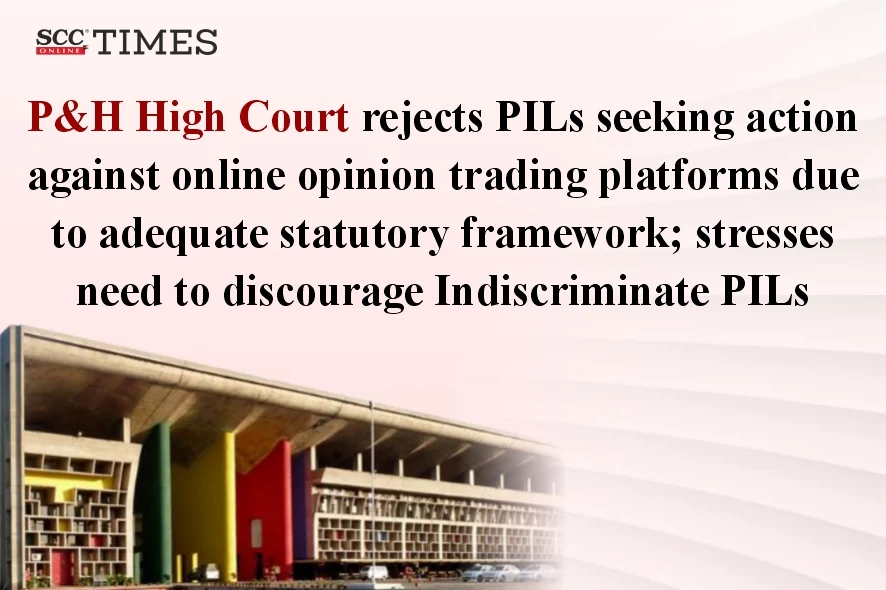Punjab and Haryana High Court: In a batch of public interest litigations (‘PILs’) seeking ban on online ‘opinion trading’ platforms in the state of Haryana, the Division Bench of Sheel Nagu, CJ., and Sumeet Goel*, J., rejected the petitions, holding that since adequate statutory frameworks exist for redressal of the mentioned grievances, there was no occasion for this Court to entertain these petitions under its extraordinary writ jurisdiction.
Background of PILs seeking ban on online ‘opinion trading’ platforms
The petitioner contended that by way of this PIL, he was seeking to bring forth the unchecked proliferation of online “opinion trading” platforms that, under the guise of innovation, were conducting large-scale betting and gambling activities in blatant violation of statutory laws. He contended that, despite a robust legal framework, the law was being flouted by the use of misleading advertisements and unregulated financial systems. Further, these ubiquitous online platforms, through a deceptive deployment of nomenclature evocative of legitimate securities trade and exchange, disingenuously presented themselves as genuine investment and trading conduits.
Analysis
At the outset, the Court remarked that PIL serves as an indispensable instrument for catalyzing profound societal transformations & fostering essential reforms and bestows upon the Court a remarkably broad and plenary jurisdiction, empowering it to ensure the unfettered dispensation of justice and to meticulously address any infringement of the fundamental constitutional rights or other legal entitlements of the citizenry.
The Court reiterated that notwithstanding this vast and pervasive jurisdiction, the Court is consistently inclined towards exercising a degree of circumspection, manifesting in the form of self-imposed judicial restraint. In this context, the caveat is that where a robust and adequate statutory framework already subsists, providing efficacious mechanisms and prescribed procedures for the redressal of a particular grievance, the invocation of the extraordinary jurisdiction of this Court by way of a PIL, in lieu of availing the remedies specifically ordained by the extant statutory provisions, is manifestly inappropriate and, indeed, impermissible.
The Court elaborated that the rationale for this judicial circumspection is manifold and deeply rooted in jurisprudential wisdom for the following reasons:
- The presence of a comprehensive statutory framework implies that the Legislature, in its collective wisdom, has already deliberated upon and provided specific avenues for grievance redressal. Allowing unfettered recourse to PIL in such instances would amount to judicial usurpation of legislative foresight and undermining the primary responsibility of the Legislature to craft laws.
- These statutory frameworks often establish administrative authorities vested with the requisite expertise. Bypassing these meticulously designed mechanisms through PIL circumvents the intended architecture of grievance redressal and potentially dilutes the role of expert authorities.
-
Encouraging indiscriminate PILs, despite available statutory remedies, leads to an unwarranted proliferation of litigation, the burden on Constitutional Courts as well as judicial docket explosion. This risks transforming Constitutional courts into primary redressal fora rather than their intended role as ultimate arbiters of Constitutional questions. Judicial resources, being scant and precious, must be conserved for matters of genuine public importance requiring direct intervention and addressing systemic injustices for those truly lacking alternative avenues.
Adverting to the facts of the petition in hand, the Court stated since adequate statutory frameworks exist for redressal of the mentioned grievances seeking ban on online opinion trading platforms , such as the Haryana Prevention of Public Gambling Act, 2025, there was no occasion for this Court to entertain these petitions under its extraordinary writ jurisdiction. However, as a matter of abundant caution and to exclude any misconstruction, the Court clarified that it had not expressed any observation on the substantive merits of the grievances and issues propounded by the petitioner. The decision to decline the entertainment of the petitions in hand was predicated solely upon the availability of a specific pre-existing statutory framework.
The Court further stated that the concerned authorities, if approached, would diligently consider the grievances and issues raised herein and proceed to adjudicate upon them strictly in accordance with law and established procedure.
Accordingly, the petitions were disposed of with liberty to the petitioner to raise his grievance before the authorities concerned in terms of existent laws.
[Anuj Malik v. Union of India, 2025 SCC OnLine P&H 3069, decided on 20-06-2025]
*Judgment authored by: Justice Sumeet Goel
Advocates who appeared in this case :
For the petitioner: Senior Advocate Atul Nanda, Rameeza Hakeem, Aditya Singh, Sunita Bishnoi, Senior Advocate Amit Jhanji, Hakikat Grewal, Vibhu Agnihotri, and Kudrit Kaur Sara
For the respondent: Senior DAG of Punjab Salil Sabhlok, Addl. A.G. of Haryana Deepak Balyan, Abhinav Sood, Mehndi Singhal, Achintaya Soni, Sayyam Garg, Nitesh Jhajhria, Additional Solicitor General of India Satya Pal Jain, Senior Panel Counsel for the UOI Dheeraj Jain, Senior Standing Counsel for CBI Sunish Bindlish, Viney Kumar, Sehajbir Singh, Diya Sodhi, Indresh Goel, Senior Advocate Akshay Bhan, and Animesh Sharma


